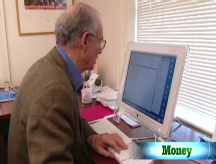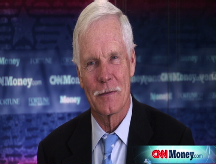Dow sinks 661 points in 3 days
The blue-chip index sheds 411 points Wednesday as recession fears take center stage. Paulson gives update on revamped $700B bailout.




NEW YORK (CNNMoney.com) -- Stocks fell Wednesday for the third session in a row, with the Dow industrials tumbling over 400 points, as investors bet that a long and deep recession is on the horizon.
The Dow Jones industrial average (INDU) lost 411 points, or about 4.7%, to 8,282.66. It was the lowest close for the blue-chip average since it settled at 8,175 on Oct. 27.
Over the past three days, the Dow has fallen more than 660 points, or 7%.
Tech stocks were also lower, with the Nasdaq composite index falling (COMP) more than 5%, or 81.69 points, to 1,499.21, its lowest level since 2003.
The Standard & Poor's 500 (SPX) index fell 5.2%, or about 46 points, to 852 - its lowest settle since Oct. 10. The small-cap average also slid to a session low of 850 points, nearing last month's intra-day low of 839 points.
Declines were broad-based with 29 of the 30 Dow components falling. The one exception was General Motors, which recovered from a recent battering.
"This is the culmination of continued bad economic news," said Todd Morgan, senior managing director of Bel Air Investment Advisors, a Los Angeles-based firm with nearly $6 billion in assets under management. "A crisis of confidence and fear is driving the market."
Market jitters were reflected in the CBOE Volatility (VIX) index, or the VIX, which rose 8.2% to close at 66.5 - its highest level since Oct. 29.
Stocks opened lower as more bad news from major retailers stoked fears that anemic consumer spending will further undermine the economy.
"The concern is that the economy will turn out worse than the current forecast [and] the recession will be longer and more severe," said Hugh Johnson, chief strategist at ThomasLloyd Global Asset Management in New York.
Prices for ultra-safe U.S. Treasury bonds rose while commodity prices tumbled. Borrowing costs continued to ease, though banks remain reluctant to lend.
Bailout shift: Wednesday's selloff gained momentum after Treasury Secretary Henry Paulson said late Wednesday morning that the government will no longer use the $700 billion bailout fund to buy illiquid assets from banks, which was its original intent. (Full story)
"Indecision is the worst thing for the market," said Dave Rovelli, managing director of U.S. equity trading at Canaccord Adams.
Paulson said the Troubled Asset Relief Program would have taken too long to implement and that direct investments in financial institutions are a better way to restore confidence and ease credit conditions.
The program will also be broadened to include support for non-bank financial institutions that provide consumer credit, such as credit cards and auto loans.
The modifications come amid reports that American Express (AXP, Fortune 500) has requested an estimated $3.5 billion in aid under the bailout plan.
On Monday, AmEx got approval from the Federal Reserve to become a bank holding company, giving it greater access to Fed funding and government rescue programs.
Meanwhile, Democratic lawmakers have been pushing to use some of the bailout fund to aid ailing automakers.
Shares of General Motors (GM, Fortune 500) and Ford Motor (F, Fortune 500) have been battered as the companies struggle with tight credit and declining sales. Both automakers have reported massive quarterly losses and had to idle thousands of workers.
However, shares of both companies rebounded Wednesday. GM's stock rose about 7%, while Ford's shares gained 3%.
Retailers: Best Buy, the nation's largest electronics retailer, cut its full-year profit forecast, citing continued weakness in consumer spending.
The company now expects earnings for the year to be between $2.30 and $2.90 a share on sales of between $43.7 billion and $45.5 billion. The company previously had forecast full-year earnings of between $3.25 and $3.40 a share.
Best Buy (BBY, Fortune 500) also said same-store sales for the year could decline by 1% to 8% compared to its previous estimate for an increase of 2% to 3%. (Full story)
Adding to the retail sector's woes, department store operator Macy's said it swung to a loss in its fiscal third quarter as wary shoppers drove sales down 7%.
The Cincinnati-based chain said it lost $44 million, or 10 cents per share, in the quarter, compared with a profit of $33 million, or 8 cents per share, a year earlier. Excluding certain charges, the loss was 8 cents per share.
Analysts had expected a loss of 19 cents per share, according to a consensus of analyst projections from Thomson Reuters.
Macy's (M, Fortune 500) stood by its earnings outlook, saying the company's annual profit would be near the lower end of its $1.30 to $1.50 a share range if sales remain weak. (Full story)
Other retailers reporting results this week: Wal-Mart (WMT, Fortune 500), the world's largest retailer, is slated to report its results Thursday, while J.C. Penney (JCP, Fortune 500) is on tap for Friday. Analysts are expecting Wal-Mart to post a profit of 76 cents per share and J.C. Penney is forecast to earn 53 cents per share.
Also on Friday, the Commerce Department will release its retail sales figures for October. Economists are expecting a decline of 2.1% from the prior month, according to a consensus of projections by Briefing.com.
Other markets: In global trading, Asian markets tumbled, with Japan's Nikkei 225 down 1.3%. European markets declined as well, with Germany's DAX falling 3%.
The dollar gained modestly against the euro but fell sharply versus the pound.
COMEX gold for December delivery fell $14.50 to settle at $718.30 an ounce.
U.S. light crude oil for December delivery slid $3.17 to settle at $56.16 a barrel on the New York Mercantile Exchange. The retreat came despite a report from the International Energy Agency predicting that oil will reach $200 a barrel by 2030. The IEA also said world energy demand will rise an average of 1.6% per year over the next few decades.
Gasoline prices dipped another 1.8 cents to a national average of $2.202 a gallon, according to a survey of credit-card activity released Tuesday by motorist group AAA. The decline marks the 56th consecutive day that prices have decreased.
Lending rates: Rates eased further as borrowing costs fell in a crunched lending market.
The 3-month Libor rate fell to 2.13% from 2.18%, according to Dow Jones, the lowest level for the rate since Oct. 27, 2004.
The overnight Libor rate rose for the second-straight day to 0.38% from 0.35%, according to Bloomberg.com.
Prices for U.S. Treasury bonds rose as demand for the ultra-safe investments remains high.
The benchmark 10-year note rose 25/32 to 102-28/32, and its yield fell to 3.64% from 3.76% late Monday.
Did you vote for Obama? How do you think the new president will affect your wallet? What do you think Obama needs to do to fix the economy - both in the short run and the long term? What should be first on the new Congress's agenda? E-mail us your thoughts, including your name, photo and contact info; the best answers will be featured in an upcoming CNNMoney.com article. ![]()







